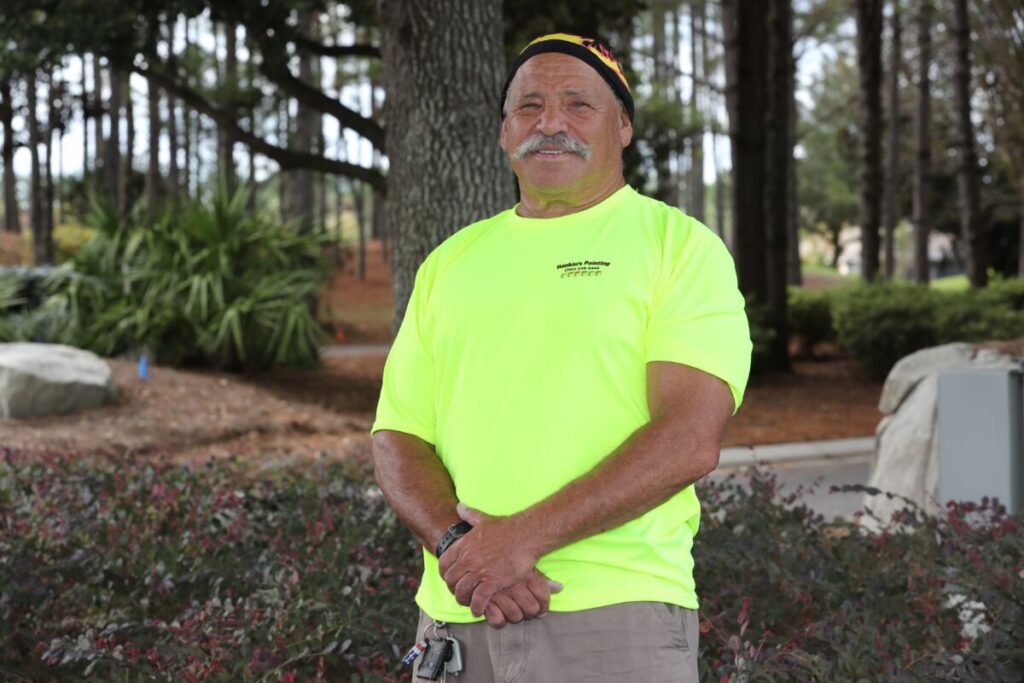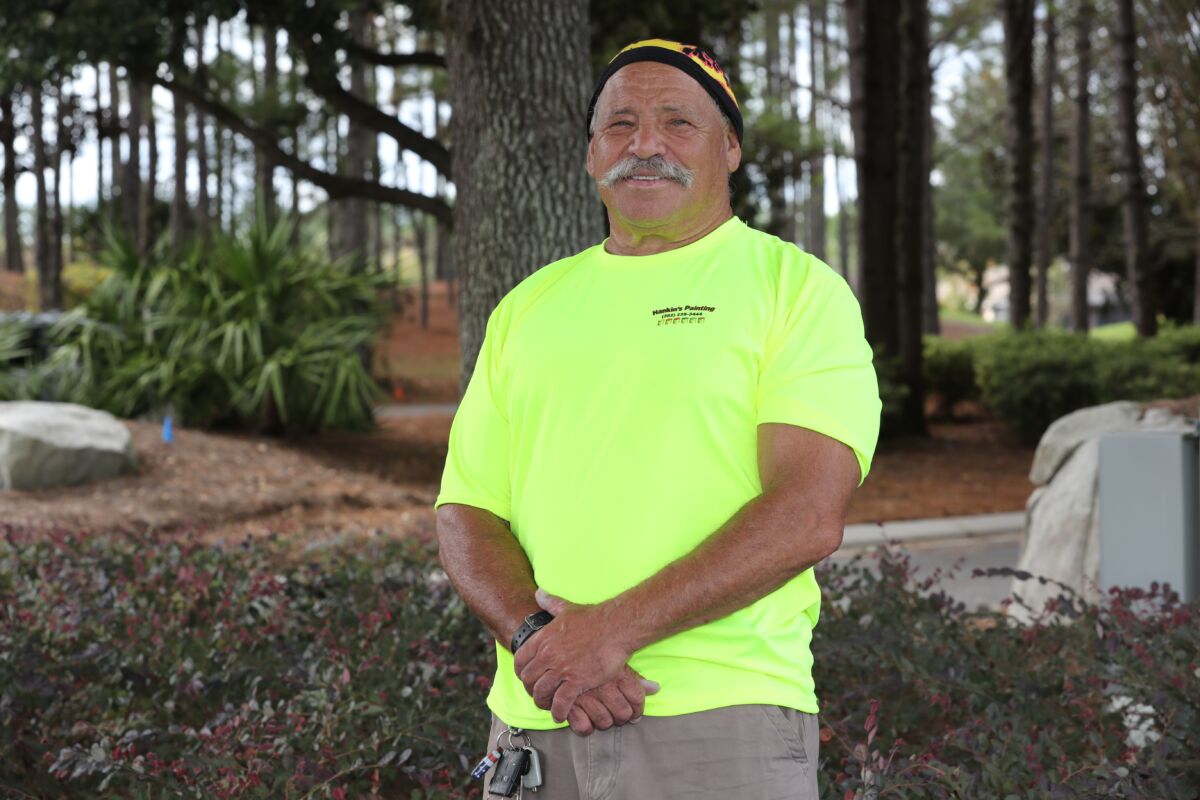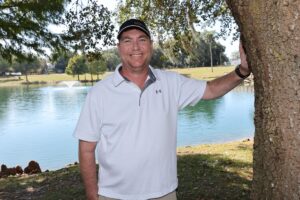Re-entry program helps felons starting over

Larry Hankin, who successfully went though the Re-Entry Center of Ocala (RECO) program, poses for a photo at the entrance of Del Webb’s Stone Creek in Ocala, Fla. on Wednesday, Oct. 20, 2021. RECO was founded in May 2005 and provides prisoner work release facilities and transitional services for the Florida Department of Corrections. Hankin was sentenced to life plus 60 years for many charges on his Feb. 8, 1994 case. He spent 20 years, 8 months and 4 days in the Department of Corrections and was released on Oct. 12, 2014. He was in the RECO program in 2014 and now owns his own painting company, Hankin’s Painting. [Bruce Ackerman/Ocala Gazette] 2021.

Larry Hankin [Bruce Ackerman/Ocala Gazette] 2021.
The Miami native is also a convicted felon that spent more than 20 years in a Florida prison for robbery to support a years-long cocaine addiction. The habit also destroyed his first marriage and a lucrative career as an accountant.
The 67-year-old attributes the 360-degree turnaround between his current and former life to God and the Re-Entry Center of Ocala (RECO), a work-release facility that’s an outgrowth of Time for Freedom, a non-profit ministry founded in 1987 by the late Bernard F. “Bernie” DeCastro, himself a former prison inmate.
“If it wasn’t for RECO there’s no way I’d be the success I am today,” said Hankin, a college graduate who spent eight months at the Center following his release from prison in 2014. “I’m incredibly grateful for the opportunities it gave me.”
The faith-based transitional program, operated through the Florida Department of Corrections, goes beyond many work release facilities by mandating budgeting classes, job readiness and training courses, as well as counseling and educational programs for its inmates, many of whom lack basic life skills when reentering society.
The Center, which currently houses 132 men at its northeast Ocala location, also helps them find gainful employment through partnerships with businesses and employers in the community, said RECO Executive Director Mauricio, “Chevy,” Chevalier.
“From day one, we start working on a program to make the individual successful and prevent recidivism,” said Chevalier, who retired from his job as an officer at the Florida Correctional Institution eleven years ago to take the helm at the Center. “We give them the tools they need to reenter society and thrive.”
Dead-end jobs with little or no upward mobility, like those in the fast-food industry, are not pursued, he said.
“We pair them with jobs they can grow into and have a career,” said Chevalier. “If they can’t support themselves or their family that can lead them on the wrong path again.”
“They have to get used to making good decisions for themselves again,” he said. “They are required to set up a budget and save a portion of their earnings each week.”
Triple Crown Trailers, Skyline Homes, a mobile home manufacturer, and Phoenix Wood Products are a
few of the Marion County businesses that have partnered with the Reentry Center.
“Our men are successful due to the community partnerships,” said Chevalier. “We used to have to beg businesses to employ our men, but now they call us when they need to hire someone because we have a proven track record.”
For Hankin, success came soon after he arrived at the Center, via local painting contractor, Swaggerty Painting. The company hired him to do prep work.
“I didn’t know anything about painting, I’d never even picked up a roller,” he said. “But I knew it was a good career opportunity for me so I worked hard.”
Soon, Hankin was given a roller and a new role as a painter, eventually becoming a foreman at the company. Within three years of his release, Hankin and his mentor became business partners, opening Hankins Residential Specialty Painting, Inc. In 2020, Hankin became the sole owner of the business and also bought out Swaggerty.
Today, Hankins employs eight painters and two handymen, has contracts with several well-known homebuilders in Marion County, and also does commercial work.
“I have a good life; God has blessed me,” he said. “But I implemented changes in my life before I got out of prison; success is due to mindset and I wanted to put things behind me and succeed.”
For Fort Lauderdale native Todd Powell, who spent 15 years in prison on drug distribution charges, RECO provided much-needed structure and life skills classes as he transitioned back into society.

Todd Powell [Bruce Ackerman/Ocala Gazette] 2021.
“What I liked about RECO was they had mandatory classes,” said Powell, 48, who is engaged and now works for a northeast Marion County municipality. “Some work-release programs don’t have anything like that; they just help you find a job and that’s it.”
“They offer you everything you need to make it,” he said, “RECO made a difference for me.”
Chevalier said RECO’s biggest obstacle is a lack of awareness within the community.
“Even though RECO’s been open since 2005, a lot of people still don’t know about us and what we do,” he said. “We are always looking for new partnerships or help from the community.”
For example, men on work release need transportation to get to and from their jobs. The Center welcomes donations of used vehicles since riding a bicycle to and from work every day can be difficult, especially in Florida’s climate.
Hankin can attest to that.
“I rode a bicycle from the Center all the way out to Walgreens by State Road 200 for eight months,” he said. “It was tough.”
Want to know more about the Re-Entry Center of Ocala? Go to reentrycenterofocala.com.





